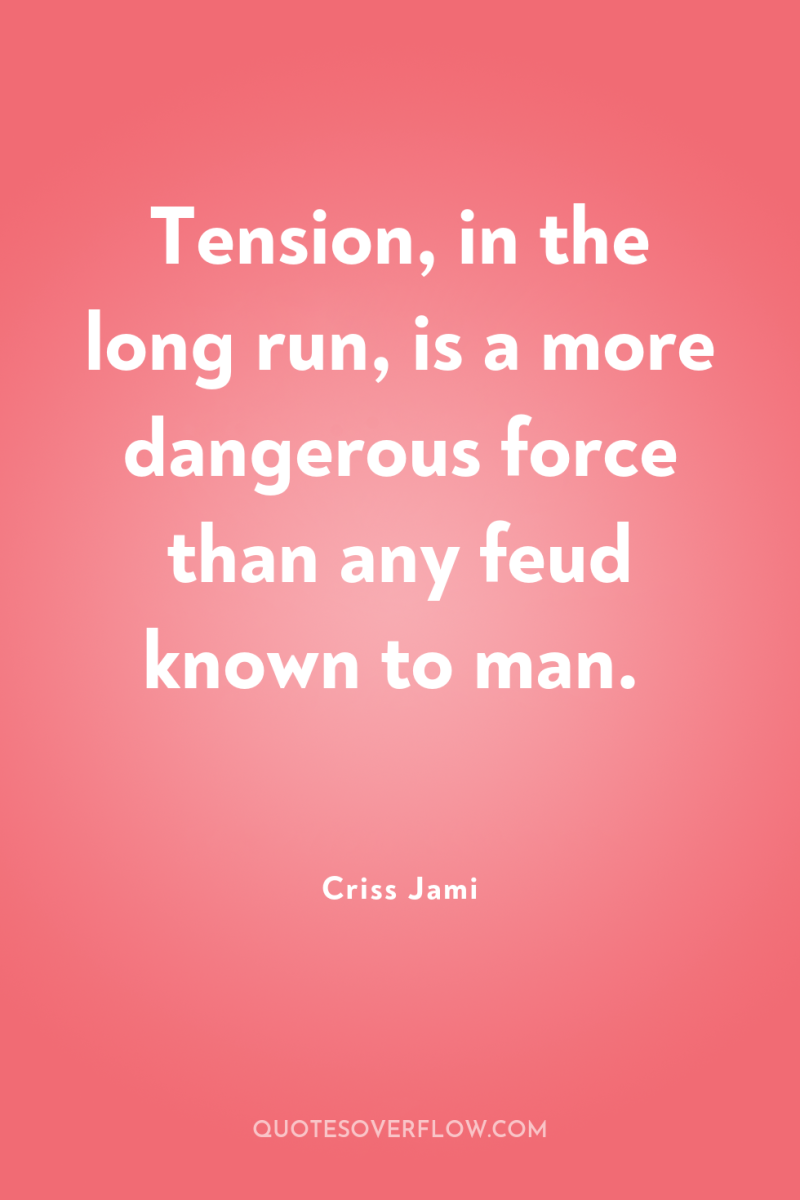
1
Tension, in the long run, is a more dangerous force than any feud known to man.Criss Jami
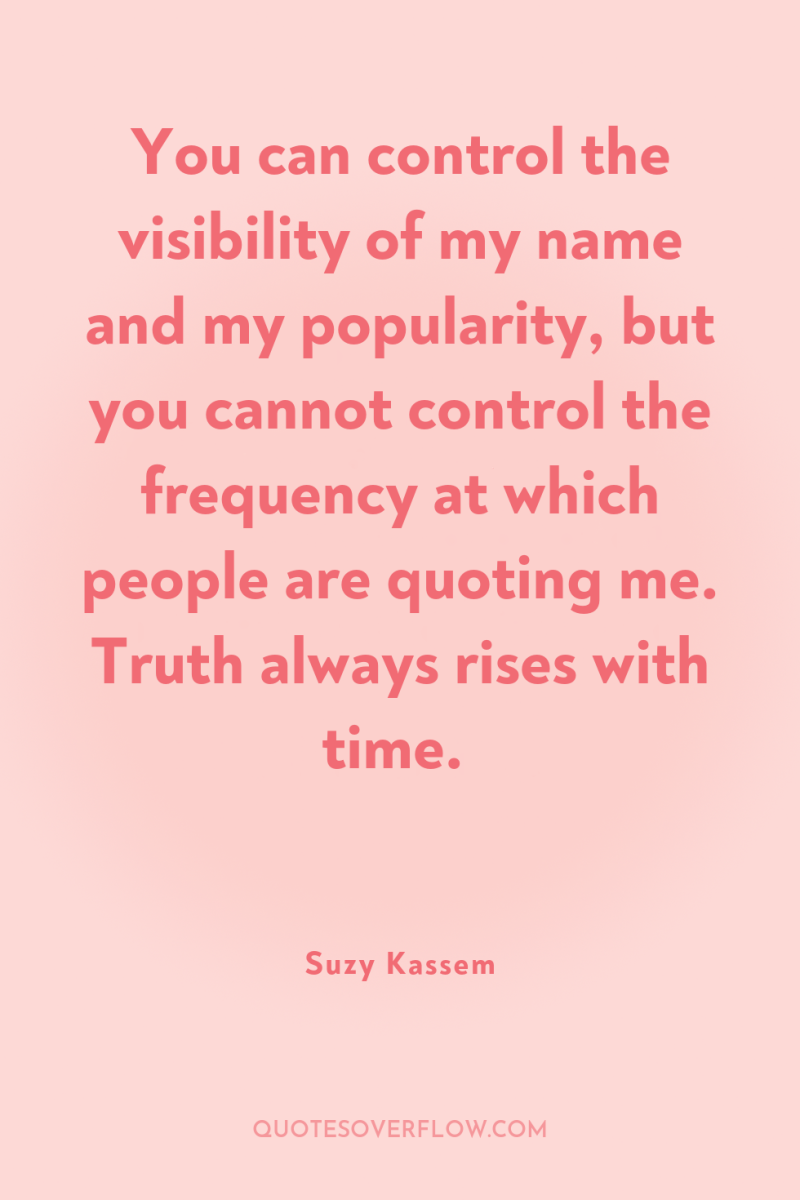
2
You can control the visibility of my name and my popularity, but you cannot control the frequency at which people are quoting me. Truth always rises with time.Suzy Kassem
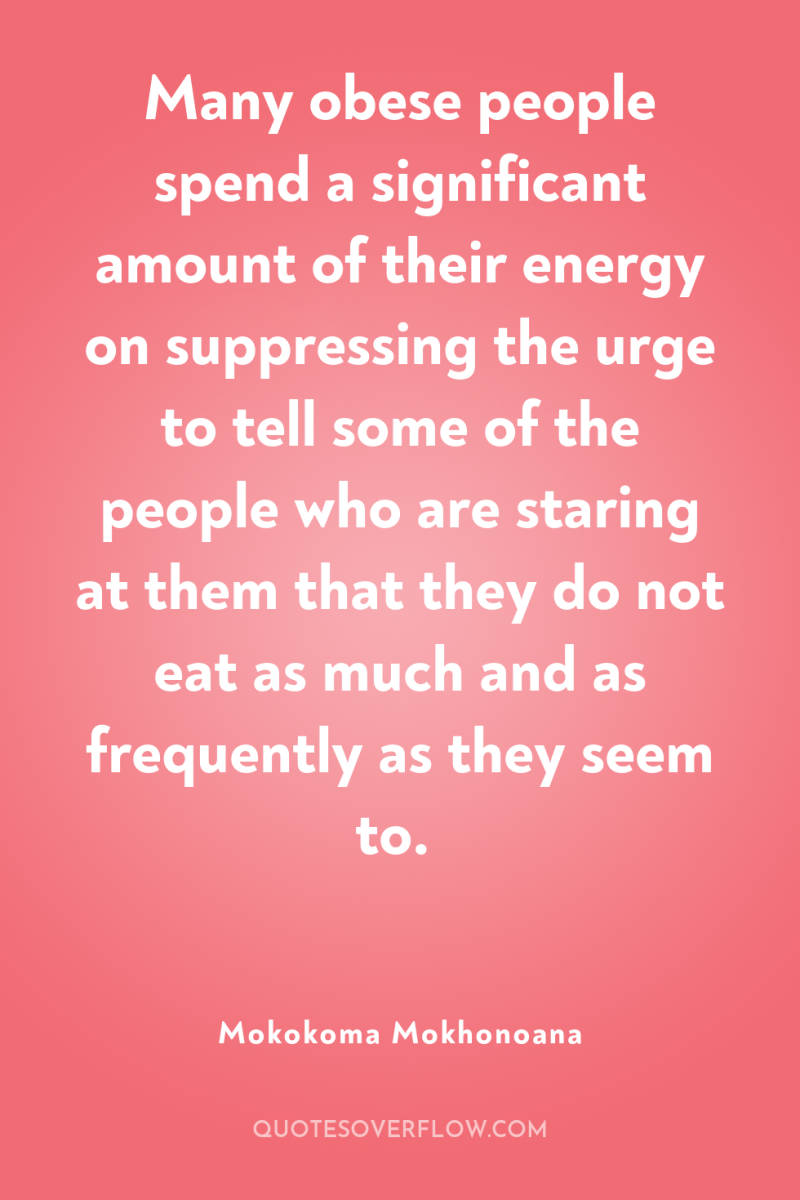
3
Many obese people spend a significant amount of their energy on suppressing the urge to tell some of the people who are staring at them that they do not eat as much and as frequently as they seem to.Mokokoma Mokhonoana
4
Because you have no memory for things that happened ten or twenty years ago, you're still mouthing the same nonsense as two thousand years ago. Worse, you cling with might and main to such absurdities as 'race, ' 'class, ' 'nation, ' and the obligation to observe a religion and repress your love.Wilhelm Reich
5
If desire causes suffering, it may be because we do not desire wisely, or that we are inexpert at obtaining what we desire. Instead of hiding our heads in a prayer cloth and building walls against temptation, why not get better at fulfilling desire? Salvation is for the feeble, that's what I think. I don't want salvation, I want life, all of life, the miserable as well as the superb. If the gods would tax ecstasy, then I shall pay; however, I shall protest their taxes at each opportunity, and if Woden or Shiva or Buddha or that Christian fellow--what's his name?--cannot respect that, then I'll accept their wrath. At least I will have tasted the banquet that they have spread before me on this rich, round planet, rather than recoiling from it like a toothless bunny. I cannot believe that the most delicious things were placed here merely to test us, to tempt us, to make it the more difficult for us to capture the grand prize: the safety of the void. To fashion of life such a petty game is unworthy of both men and gods. .Tom Robbins
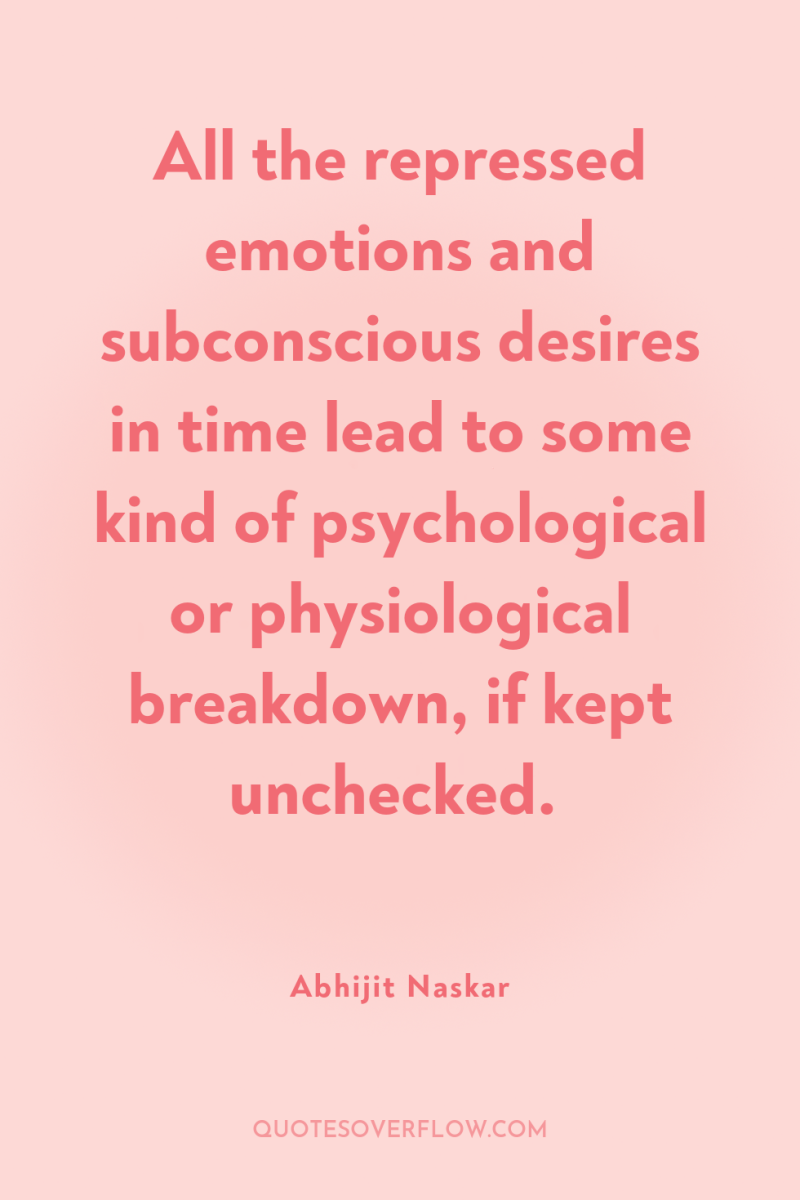
6
All the repressed emotions and subconscious desires in time lead to some kind of psychological or physiological breakdown, if kept unchecked.Abhijit Naskar
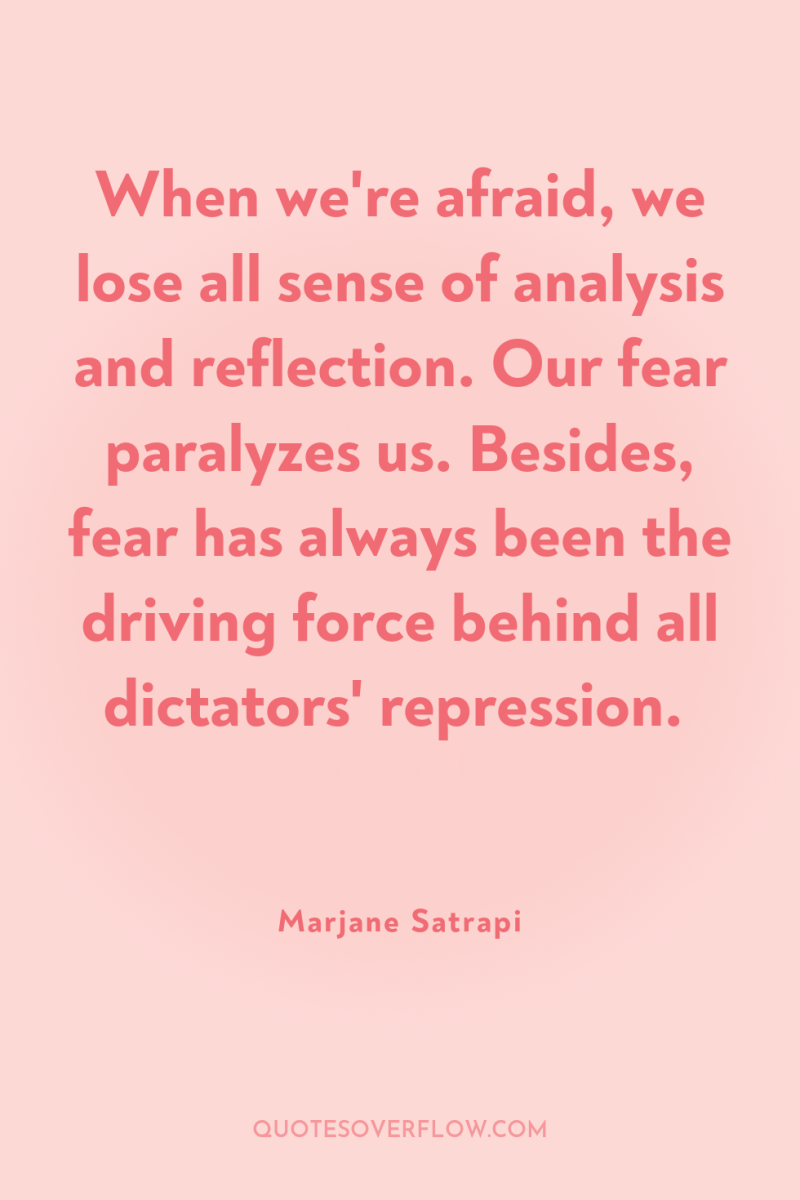
7
When we're afraid, we lose all sense of analysis and reflection. Our fear paralyzes us. Besides, fear has always been the driving force behind all dictators' repression.Marjane Satrapi
8
Without realizing that the past is constantly determining their present actions, they avoid learning anything about their history. They continue to live in their repressed childhood situation, ignoring the fact that is no longer exists, continuing to fear and avoid dangers that, although once real, have not been real for a long time.Alice Miller
9
... you sometimes had to force people to say things they would rather not articulate, just so they could hear their own words. It was interesting the way people could know things and not know them at the same time. Denial, he said, was like a thick stone wall.Nell Freudenberger
10
There are many roles that people play and many images that they project. There is, for example, the "nice" man who is always smiling and agreeable. "Such a nice man, " people say. "He never gets angry." The facade always covers its opposite expression. Inside, such a person is full of rage that he dares not acknowledge or show. Some men put up a tough exterior to hide a very sensitive, childlike quality. Even failure can be a role. Many masochistic characters engage in the game of failure to cover an inner feeling of superiority. An outward show of superiority could bring down on them the jealous wrath of the father and the threat of castration. As long as they act like failures they can retain some sexuality, since they are not a threat to her father. .Alexander Lowen
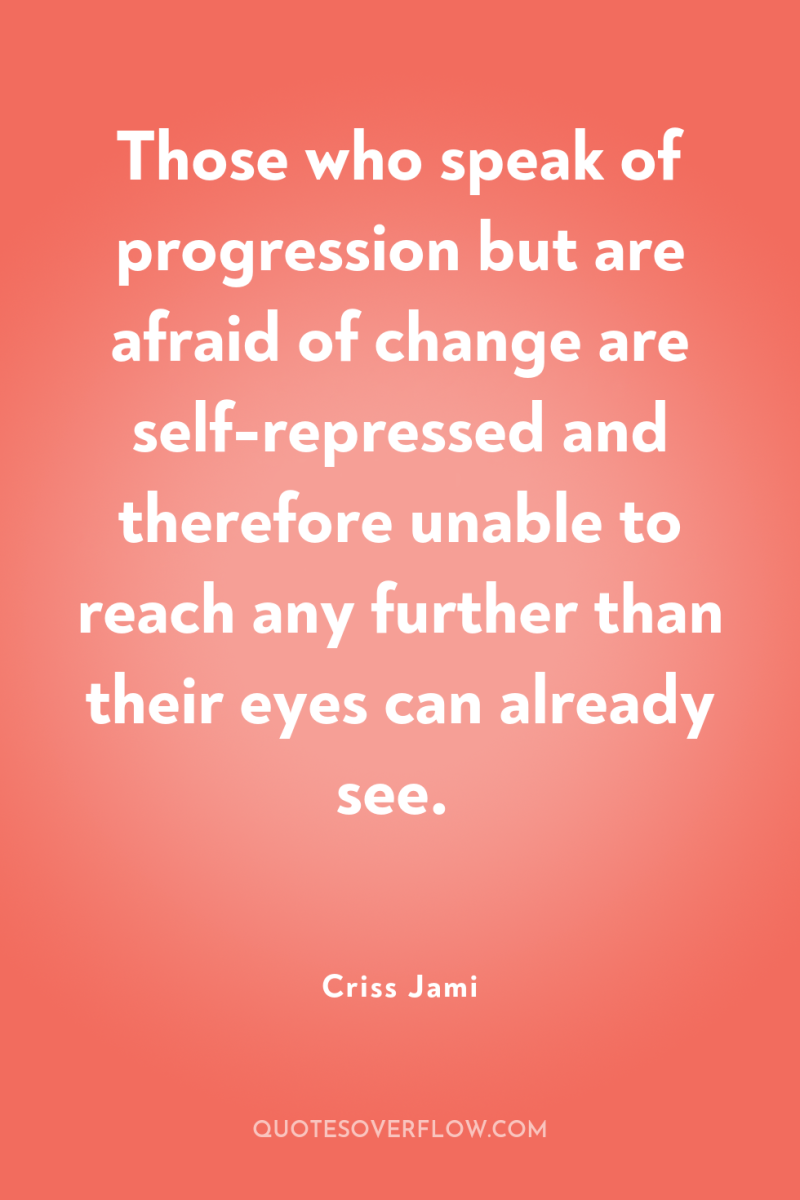
11
Those who speak of progression but are afraid of change are self-repressed and therefore unable to reach any further than their eyes can already see.Criss Jami
12
First Afghanistan, now Iraq. So who's next? Syria? North Korea? Iran? Where will it all end?' If these illegal interventions are permitted to continue, the implication seems to be, pretty soon, horror of horrors, no murderously repressive regimes might remain.Daniel Kofman
13
This is what it means to be a woman in this world. Every step is a bargain with pain. Make your black deals in the black wood and decide what you’ll trade for power. For the opposite of weakness, which is not strength but hardness. I am a trap, but so is everything. Pick your price. I am a huckster with a hand in your pocket. I am freedom and I will eat your heart.Catherynne M. Valente
14
Repression is a seamless garment; a society which is authoritarian in its social and sexual codes, which crushes its women beneath the intolerable burdens of honour and propriety, breeds repressions of other kinds as well.Salman Rushdie
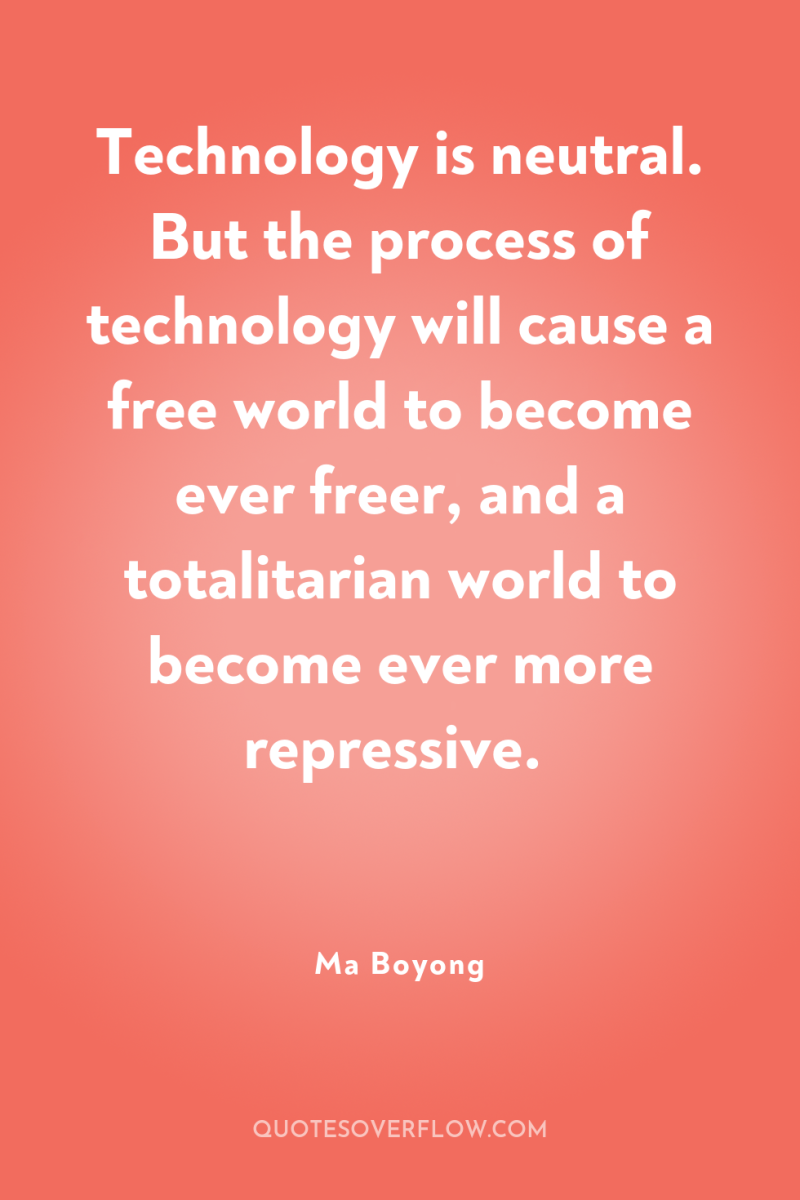
15
Technology is neutral. But the process of technology will cause a free world to become ever freer, and a totalitarian world to become ever more repressive.Ma Boyong
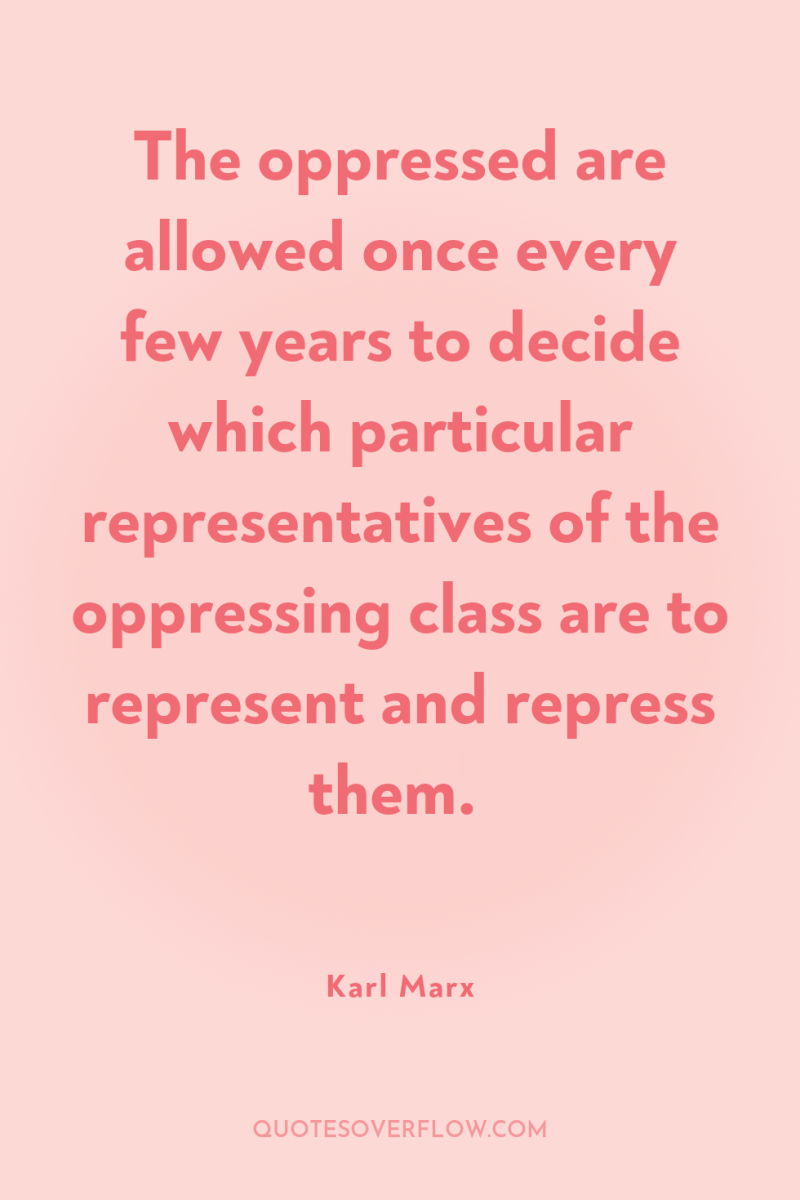
16
The oppressed are allowed once every few years to decide which particular representatives of the oppressing class are to represent and repress them.Karl Marx
17
Once a government is committed to the principle of silencing the voice of opposition, it has only one way to go, and that is down the path of increasingly repressive measures, until it becomes a source of terror to all its citizens and creates a country where everyone lives inHarry Truman
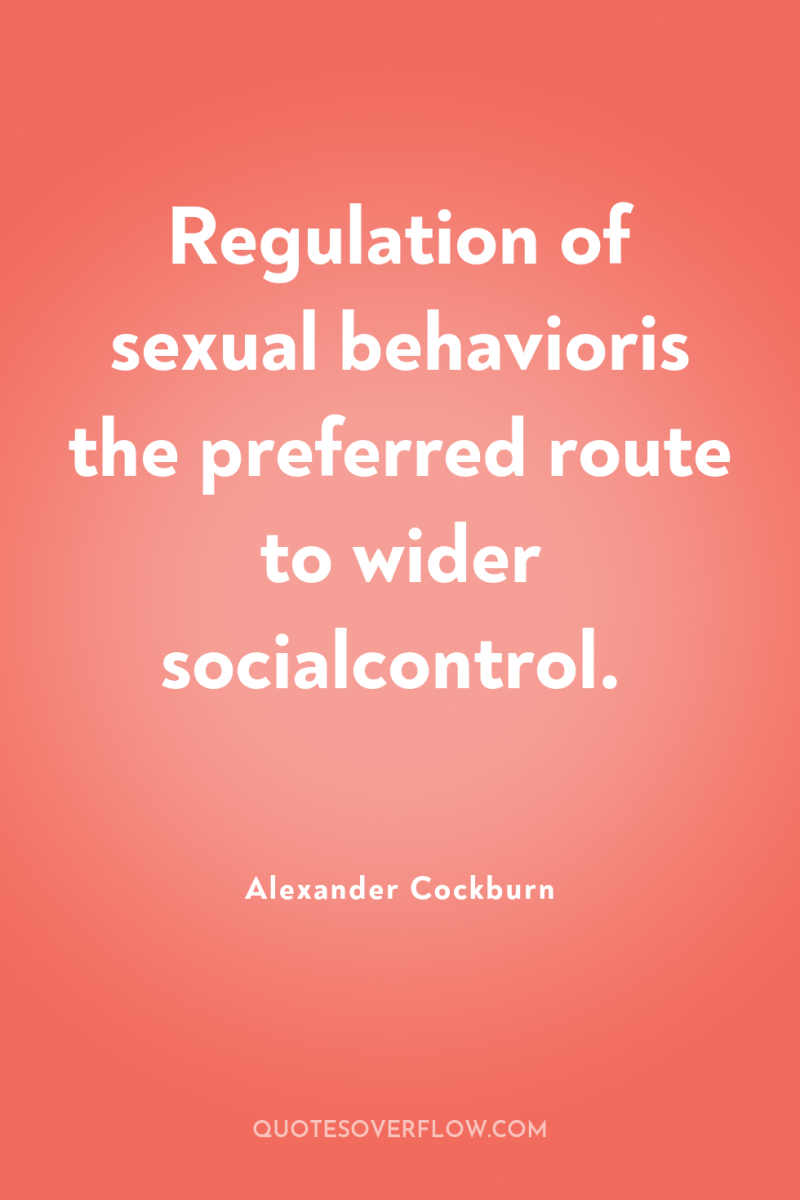
18
Regulation of sexual behavioris the preferred route to wider socialcontrol.Alexander Cockburn
19
The teachings of the Mage Guild were that none of these others was real, no one else and nothing anywhere was real, that everything around him was merely a shadow born of Alain's own illusions. He had accepted that wisdom–until he had met Mari. In a world where nothing was allowed to change, Alain had been changed. He could let himself feel emotions again. He had learned what it meant to help someone else. He had learned what a friend was. He had forgotten what love was. Until he had fallen in love.Jack Campbell
20
When we get hurt, our bodies immediately start trying to heal that hurt. This works for emotions as well. If we were scarred socially, by an incident of rejection or bullying, we immediately start trying to heal. Like pus comes out of wounds, emotions flow from psychological wounds. And what do we really need at that moment? When we are out of that dangerous situation that scarred us, and we become triggered by some little thing - what do we need? Do we need someone to look at us and say, "Wow, you're really sensitive, aren't you?" or "Hey, man, I didn't mean it like that."? Do we need someone to justify their actions or tell us to take it easy, because the situation didn't really require such a reaction? And, from ourselves, do we really need four pounds of judgment with liberal helpings of shame? Do we need to run away, to suppress, to hate our "over-sensitivity" to situations that seem innocuous to others? No. We do not need all of these versions of rejection of a natural healing process. You would not feel shame over a wound doing what it must do to heal, nor would you shame another. So why do we do this to our heart wounds? Why do we do it to ourselves? To others? Next time some harmless situation triggers you or someone around you into an intense emotion - realize it's an attempt at emotional healing. Realize the danger is no longer there, but don't suppress the healing of old dangers and old pains. Allow the pain. Don't react, but don't repress. Embrace the pain. Embrace the pain of others. Like this, we have some chance at healing the endless cycles of generational repression and suppression that are rolling around in our society. Fall open. Break open. Sit with others' openness. Let love be your medicine.Vironika Tugaleva
21
Know that it is your birthright to awaken. Seeking Truth is the ultimate quest of every moral citizen. Truth is felt first in the heart, and then the mind. The voice of your conscience comes from your heart, not your mind. The voice of reason comes from your mind, not your heart. Your mind is simply there to reason with your heart. Always listen to your heart first. Those who look for Truth through the mind before the heart will never find Truth. When you come close to Truth, the first sign will be an inner sense of liberation. Truth will NEVER imprison you. Only the repression of your conscience will. This is what is meant by 'THE TRUTH WILL SET YOU FREE'.Suzy Kassem
22
Silence descended on the house. [....] Amma must have sensed that this was the sort of silence that, left unchallenged, could consume the family from within.Vivek Shanbhag
23
The attempt to escape from pain, is what creates more pain.Unknown
24
While the repression of a memory is a psychological process, the suppression of feeling is accomplished by deadening a part of the body or reducing its motility so that feeling is diminished. The repression of the memory is dependent upon and related to the suppression of feeling, for as long as the feeling persists, the memory remains vivid. Suppression entails the development of chronic muscular tension in those areas of the body where the feeling would be experienced. In the case of sexual feeling, this tension is found in and about the abdomen and pelvis.Alexander Lowen
25
It seems to me a measure of the true perversity of the human race, that one of its very few reliably pleasurable activities should be the subject of so much hysteria and repression.A Dangerous Method
26
It’s all society is, the repressed sex drives of men, the objectification of women, their paranoia, the posturing, the macho stances, the beauty standard, it’s all just one charade masking a never ending hard on.Trevor D. Richardson
27
-The very absence of the freedom to criticise against your own or any other government is all the more a reason to loudly shout-out for democracy! If that is wrong, Drew boldly went on, -then I would rather be wrong then to be numbered among the majority of the so-called righteous people whose only mandate seems to be controlling people. If a government is against its people expressing themselves, then that government is obviously hiding something criminal from its people and the world, and it is therefore afraid of being exposed and losing whatever power it has.Andrew James Pritchard
28
When emotions are expressed...all systems are united and made whole. When emotions are repressed, denied, not allowed to be whatever they may be, our network pathways get blocked, stopping the flow of the vital feel-good, unifying chemicals that run both our biology and our behavior.Candace B. Pert
29
Being in a state of denial is auniversally human response tosituations which threaten tooverwhelm. People who were abusedas children sometimes carry theirdenial like precious cargo without aport of destination. It enabled us tosurvive our childhood experiences, and often we still live in survival mode decades beyond the actual abuse. We protect ourselves to excess because we learned abruptly and painfully that no one else would. .Sarah E. Olson
30
It is not only negative feelings that become blocked. The repression extends to more and more of his emotional capacity. When one is given an anesthetic in preparation for surgery, it is not merely the capacity to experience pain that is suspended; the capacity to experience pleasure goes also - because what is blocked is the capacity to experience *feeling*. The same principle applies to the repression of emotions." Chapter 1: Discovering the Unknown Self, pg. 9, Bantam Edition, 1984 .Nathaniel Branden
31
Love is a kind of symptom that arises through the repression of libido.Frank Tallis
32
In writing these poems about relatives, I found it almost impossible to write about the mother. I was stuck. My feelings about my mother, you see, must be too complicated to easily flow into words.Ted Hughes
33
When inhibition has become the de facto setting in a person's manner, stiffness and lack of spontaneity produces an unnatural self-repression. Life looks gray, dull, and rigid, without space for relaxation or play to burst forth in natural ways.Alexandra Katehakis
34
Grief denied will surface in borrowed clothes, the mad, sad clothes of paranoia, fear or lonelinessJohnny Rich
35
Those who nurse secrets, nurse a chaotic world of amplified silence.B.G. Bowers
36
Why would a person prefer the accusations of guilt, unworthiness, ineptitude - even dishonor and betrayal- to real possibility? This may not seem to be the choice, but it is: complete self effacement, surrender to the "others", disavowal of any personal dignity and freedom-on the one hand; and freedom and independence, movement away from the others, extrication of oneself from the binding links of family and social duties-on the other hand. This is the choice that the depressed person actually faces.Ernest Becker
37
Repression. Her therapist, Dr. Solomon, loved the word. He'd say it slowly, letting it roll off his tongue. Sometimes he'd add a chin stroke for good measure. He always looked pleased when he did this, like he'd discovered the Caramilk secret or something.Jo Ann Yhard
38
Unexpressed grief leaves the deepest scars.Marty Rubin
39
The psychoanalytic liberation of memory explodes the rationality of the repressed individual. As cognition gives way to re-cognition, the forbidden images and impulses of childhood begin to tell the truth that reason denies.Herbert Marcuse
40
When you’re finally finished crying, I hope you run as fast and as far as you possibly can from me. When you land, out of breath, and I’m finally out of sight, finally out of mind, you’ll be honestly fine. All wounds will be healed. All fires will be extinguished. I’ll be a memory. Feel free to repress me.Kris Kidd
41
Repression is dangerous. It makes anvils of memories and drops them from impossible heights when you least expect it.Kris Kidd
42
Dissociation is the common response of children to repetitive, overwhelming trauma and holds the untenable knowledge out of awareness. The losses and the emotions engendered by the assaults on soul and body cannot, however be held indefinitely. In the absence of effective restorative experiences, the reactions to trauma will find expression. As the child gets older, he will turn the rage in upon himself or act it out on others, else it all will turn into madness. .Judith Spencer
43
[A]dventures befall the unadventurous as readily, if not as frequently, as the bold. Adventures are a logical and reliable result - and have been since at least the time of Odysseus - of the fatal act of leaving one's home, or trying to return to it again. All adventures happen in that damned and magical space, wherever it may be found or chanced upon, which least resembles one's home. As soon as you have crossed your doorstep or the county line, into that place where the structures, laws, and conventions of your upbringing no longer apply, where the support and approval (but also the disapproval and repression) of your family and neighbors are not to be had: then you have entered into adventure, a place of sorrow, marvels, and regret. .Michael Chabon
44
It felt important to be able to pick up and go whenever this endless stirring and inevitable craving for a change of scenery would bubble over because I didn’t want to die someday yearning for something else when it was only “something else” worth living.Jackie Haze
45
There is no great reward for being emotionally withdrawn, no pity prize for bottling your frustration. No one is coming to congratulate your chronic self-repression. By opening up, maybe you will inconvenience some people. Maybe you will trigger some conflict. Maybe you will be rejected, criticized, judged. Everything comes with a price and everything has its compensation. Authenticity may require pain, but it also opens the doors to joy, creativity, self-respect, empathy. Self-repression, on the other hand, costs you all the beauty of the world in exchange for a prison of comfort. Is it really worth it? Isn't it time to break free? .Vironika Tugaleva
46
When we operate on the basis of the will to control, we are aware of only one kind of "evil": the failure of existence to conform to the plan we have for it.Jerome A. Miller
47
Is is as if life or reality itself has had it in mind all along to unravel the very design i have been trying all along to impose on it.Jerome A. Miller
48
What we work so hard to avoid is the shattering of our lives by horrors we know we will be helpless to control.Jerome A. Miller
49
Now, however open a person manages to be, there is one possibility to which he remains as closed as ever: the possibility that when he uncovers his deepest anxieties he will find hidden inside them certain horrifying truths which his whole effort to control his life has been designed to keep repressed.Jerome A. Miller
50
I get what it's like to want something, but to try and force yourself to really believe that you don't.Cora Carmack
51
I regret it when I suppress my feelings too long and they burst forth in ways that are distorted or attacking or hurtful.Carl R. Rogers
52
How often it is that the angry man rages denial of what his inner self is telling him.Frank Herbert
53
The anger response, like the fear response, is a frequent target for repression. Imagine a 6-year-old girl who is angry at her 10-year-old brother for teasing her. In response, she might make an angry face, yell at her brother, and strike out at him with her fists. It’s an instinctual, energizing reaction designed to protect her from danger. Someone is violating her sense of well-being, and she’s afraid that if she doesn’t stop the intruder, she’ll get hurt.“ A wise parent would validate the girl’s angerâ€Å–â€Åit’s infuriating to be teasedâ€Å–â€Åand help her find a verbal rather than a physical way to express it. ‘You are very mad at your brother for teasing you, ’ says this model parent, ‘I would be, too. Tell him in words how angry you feel. He needs to know.’ This way, the girl can protect herself from her brother and purge herself of her anger without having to resort to physical violence. Her self-protective anger remains intact. It has simply been given a ore ‘civilized’ form of expression. .Patricia Love
54
As she had been walking from the ward to that room, she had felt such pure hatred that now she had no more rancor left in her heart. She had finally allowed her negative feelings to surface, feelings that had been repressed for years in her soul. She had actually FELT them, and they were no longer necessary, they could leave.Paulo Coelho
55
My fiancé immediately began to look uncomfortable, but did not voice this discomfort except by a soft gurgling sound in the throat .. . The gurgling escalated, but my mother politely switched on the dishwasher, and soon we heard mostly the sound of machinery rather than that of a person's feelings surfacing.Alexandra Kleeman
56
Your love for beauty has been perverted, repressed and savaged by hateful and controlling elements in the world.Bryant McGill
57
Once the government can demand of a publisher the names of the purchasers of his publications, the free press as we know it disappears. Then the spectre of a government agent will look over the shoulder of everyone who reads. The purchase of a book or pamphlet today may result in a subpoena tomorrow. Fear of criticism goes with every person into the bookstall. The subtle, imponderable pressures of the orthodox lay hold. Some will fear to read what is unpopular, what the powers-that-be dislike. When the light of publicity may reach any student, any teacher, inquiry will be discouraged. The books and pamphlets that are critical of the administration, that preach an unpopular policy in domestic or foreign affairs, that are in disrepute in the orthodox school of thought will be suspect and subject to investigation. The press and its readers will pay a heavy price in harassment. But that will be minor in comparison with the menace of the shadow which government will cast over literature that does not follow the dominant party line. If the lady from Toledo can be required to disclose what she read yesterday and what she will read tomorrow, fear will take the place of freedom in the libraries, book stores, and homes of the land. Through the harassment of hearings, investigations, reports, and subpoenas government will hold a club over speech and over the p .William O. Douglas
58
The disowned part of self is an energy - an emotion or desire or need, that has been shamed every time it emerged. These energy patterns are repressed but not destroyed. They are alive in our unconscious.John Bradshaw
59
Are you a kind of person who likes to keep all your emotions hidden from the people around you! Do you prefer restraining your feelings a little too much! In that case, you must know that too much emotional suppression can have catastrophic impact over your body.Abhijit Naskar
60
My only regret is that no one told me at the beginning of my journey what I'm telling you now: there will be an end to your pain. And once you've released all those pent-up emotions, you will experience a lightness and buoyancy you haven't felt since you were a very young child. The past will no longer feel like a lode of radioactive ore contaminating the present, and you will be able to respond appropriately to present-day events. You will feel angry when someone infringes on your territory, but you won't overreact. You will feel sad when something bad happens to you, but you won't sink into despair. You will feel joy when you have a good day, and your happiness won't be clouded with guilt. You, too, will have succeeded in making history, history. .Patricia Love
61
When distinction of any kind, even intellectual distinction, is somehow resented as a betrayal of the American spirit of equal opportunity for all, the result must be just this terror of individualistic impulses setting us apart, either above or below our neighbours; just this determination to obey without questioning and to subscribe with passion to the conventions and traditions. The dilemma becomes a very real one: How can this sense of democratic equality be made compatible with respect for exceptional personalities or great minds? How can democracy, as we understand it today, with its iron repression of the free spirit, its monotonous standardisation of everything, learn to cherish an intellectual aristocracy without which any nation runs the risk of becoming a civilisation of the commonplace and the second-rate? .Harold Edmund Stearns
62
Survival depends on denial, and death comes swiftly to those who forsake it.B.G. Bowers
63
Propaganda is to a democracy what the bludgeon is to a totalitarian state.Noam Chomsky
64
Life was taking its vengeance on me, and that vengeance consisted merely in coming back, nothing more. Every case of madness involves something coming back. People who are possessed are not possessed by something that just comes but instead by something that comes back. Sometimes life comes back. If in me everything crumbled before that power, it is not because that power was itself necessarily an overwhelming one: it in fact had only to come, since it had already become too full-flowing a force to be controlled or contained - when it appeared it overran everything. And then, like after a flood, there floated a wardrobe, a person, a loose window, three suitcases. And that seemed like Hell to me, that destruction of layers and layers of human archaeology. .Clarice Lispector
65
You could continue to repress and think about the life you could have had or you can take what you want from life and see that the world finds that person infinitely more irresistible...Roberto Hogue
66
..ideas are definitely unstable, they not only CAN be misused, they invite misuse--and the better the idea the more volatile it is. That's because only the better ideas turn into dogma, and it is this process whereby a fresh, stimulating, humanly helpful idea is changed into robot dogma that is deadly. In terms of hazardous vectors released, the transformation of ideas into dogma rivals the transformation of hydrogen into helium, uranium into lead, or innocence into corruption. And it is nearly as relentless. The problem starts at the secondary level, not with the originator or developer of the idea but with the people who are attracted by it, who adopt it, who cling to it until their last nail breaks, and who invariably lack the overview, flexibility, imagination, and most importantly, sense of humor, to maintain it in the spirit in which it was hatched. Ideas are made by masters, dogma by disciples, and the Buddha is always killed on the road. There is a particularly unattractive and discouragingly common affliction called tunnel vision, which, for all the misery it causes, ought to top the job list at the World Health Organization. Tunnel vision is a disease in which perception is restricted by ignorance and distorted by vested interest. Tunnel vision is caused by an optic fungus that multiplies when the brain is less energetic than the ego. It is complicated by exposure to politics. When a good idea is run through the filters and compressors of ordinary tunnel vision, it not only comes out reduced in scale and value but in its new dogmatic configuration produces effects the opposite of those for which it originally was intended. That is how the loving ideas of Jesus Christ became the sinister cliches of Christianity. That is why virtually every revolution in history has failed: the oppressed, as soon as they seize power, turn into the oppressors, resorting to totalitarian tactics to "protect the revolution." That is why minorities seeking the abolition of prejudice become intolerant, minorities seeking peace become militant, minorities seeking equality become self-righteous, and minorities seeking liberation become hostile (a tight asshole being the first symptom of self-repression). .Tom Robbins
67
The hide was being flayed off the still living body of the Revolution so that a new age could slip in to it; as for the red bloody meat, the steaming innards - they were being thrown onto the scrapheap. The new age needed only the hide of the Revolution - and this was being flayed off people who were still alive. Those who slipped into it spoke the language of the Revolution and mimicked it's gestures, but their brains, lungs, livers and eyes were utterly different.Vasily Grossman
68
As long as you keep secrets and suppress information, you are fundamentally at war with yourself… The critical issue is allowing yourself to know what you know. That takes an enormous amount of courage.Unknown
69
Treating Abuse Today (Tat), 3(4), pp. 26-33Freyd: I see what you're saying but people in psychology don't have a uniform agreement on this issue of the depth of -- I guess the term that was used at the conference was -- "robust repression." T A T: Well, Pamela, there's a whole lot of evidence that people dissociate traumatic things. What's interesting to me is how the concept of "dissociation" is side-stepped in favor of "repression." I don't think it's as much about repression as it is about traumatic amnesia and dissociation. That has been documented in a variety of trauma survivors. Army psychiatrists in the Second World War, for instance, documented that following battles, many soldiers had amnesia for the battles. Often, the memories wouldn't break through until much later when they were in psychotherapy. Freyd: But I think I mentioned Dr. Loren Pankratz. He is a psychologist who was studying veterans for post-traumatic stress in a Veterans Administration Hospital in Portland. They found some people who were admitted to Veteran's hospitals for postrraumatic stress in Vietnam who didn't serve in Vietnam. They found at least one patient who was being treated who wasn't even a veteran. Without external validation, we just can't know --TAT: -- Well, we have external validation in some of our cases. Freyd: In this field you're going to find people who have all levels of belief, understanding, experience with the area of repression. As I said before it's not an area in which there's any kind of uniform agreement in the field. The full notion of repression has a meaning within a psychoanalytic framework and it's got a meaning to people in everyday use and everyday language. What there is evidence for is that any kind of memory is reconstructed and reinterpreted. It has not been shown to be anything else. Memories are reconstructed and reinterpreted from fragments. Some memories are true and some memories are confabulated and some are downright false. T A T: It is certainly possible for in offender to dissociate a memory. It's possible that some of the people who call you could have done or witnessed some of the things they've been accused of -- maybe in an alcoholic black-out or in a dissociative state -- and truly not remember. I think that's very possible. Freyd: I would say that virtually anything is possible. But when the stories include murdering babies and breeding babies and some of the rather bizarre things that come up, it's mighty puzzling. T A T: I've treated adults with dissociative disorders who were both victimized and victimizers. I've seen previously repressed memories of my clients' earlier sexual offenses coming back to them in therapy. You guys seem to be saying, be skeptical if the person claims to have forgotten previously, especially if it is about something horrible. Should we be equally skeptical if someone says "I'm remembering that I perpetrated and I didn't remember before. It's been repressed for years and now it's surfacing because of therapy." I ask you, should we have the same degree of skepticism for this type of delayed-memory that you have for the other kind? Freyd: Does that happen? T A T: Oh, yes. A lot.David L. Calof
70
Treating Abuse Today 3(4) pp. 26-33Freyd: The term "multiple personality" itself assumes that there is "single personality" and there is evidence that no one ever displays a single personality. T A T: The issue here is the extent of dissociation and amnesia and the extent to which these fragmentary aspects of personality can take executive control and control function. Sure, you and I have different parts to our mind, there's no doubt about that, but I don't lose time to mine they can't come out in the middle of a lecture and start acting 7 years old. I'm very much in the camp that says that we all are multi-minds, but the difference between you and me and a multiple is pretty tangible. Freyd: Those are clearly interesting questions, but that area and the clinical aspects of dissociation and multiple personalities is beyond anything the Foundation is actively.. T A T: That's a real problem. Let me tell you why that's a problem. Many of the people that have been alleged to have "false memory syndrome" have diagnosed dissociative disorders. It seems to me the fact that you don't talk about dissociative disorders is a little dishonest, since many people whose lives have been impacted by this movement are MPD or have a dissociative disorder. To say, "Well, we ONLY know about repression but not about dissociation or multiple personalities" seems irresponsible. Freyd: Be that as it may, some of the scientific issues with memory are clear. So if we can just stick with some things for a moment; one is that memories are reconstructed and reinterpreted no matter how long ago or recent. T A T: You weigh the recollected testimony of an alleged perpetrator more than the alleged victim's. You're saying, basically, if the parents deny it, that's another notch for disbelief. Freyd: If it's denied, certainly one would want to check things. It would have to be one of many factors that are weighed -- and that's the problem with these issues -- they are not black and white, they're very complicated issues.David L. Calof
71
Unexpressed emotions will never die. They are buried alive and will come forth later in uglier ways.Sigmund Freud
72
What then did you expect when you unbound the gag that muted those black mouths? That they would chant your praises? Did you think that when those heads that our fathers had forcibly bowed down to the ground were raised again, you would find adoration in their eyes?JeanPaul Sartre
73
I wonder if being sane means disregarding the chaos that is life, pretending only an infinitesimal segment of it is reality.Rabih Alameddine
74
Often, her mate is the child of a narcissist, already indoctrinated to regard exploitation and disregard as love. Others lured by the narcissistic aura are those in whom healthy childhood exhibitionism has been repressed. If the parent puts the child to shame for showing off, the need for attention gets repressed into the unconscious. Repression means that the need is not satisfied and continues to press for expression in the adult without her being aware of it. The repressed adult may select an exhibitionistic mate to achieve vicarious satisfaction.Elan Golomb
75
Memory repression thrives in shame, secrecy, and shock. The shame and degradation experienced during sexual assault is profound, especially for children who have no concept of what is happening to them or why. Sexual abuse is so bizarre and horrible that the frightened child feels compelled to bury the event deep inside his or her mind.Renee Fredrickson
76
We could not be fulfilled if we weren't inauthentic some of the time–inauthentic, that is, in relation to such things as our passing desires to throttle our children, poison our spouse, or end our marriage over a dispute about changing a lightbulb.Alain De Botton
77
With all due respect to all philistines, the dictatorship of the proletariat does just consist in "giving a hiding" to the classes that were previously supreme, before forcing them to recognize the new order and to submit to it.Leon Trotsky
78
We are afraid of what we will do to others, afraid of the rage that lies in wait somewhere deep in our souls. How many human beings go through the world frozen with rage against life! This deeply hidden inner anger may be the product of hurt pride or of real frustration in office, factory, clinic, or home. Whatever may be the cause of our frozen rage (which is the inevitable mother of depression), the great word of hope today is that this rage can be conquered and drained off into creative channels ……What should we do? We should all learn that a certain amount of aggressive energy is normal and certainly manageable in maturity. Most of us can drain off the excess of our angry feelings and destructive impulses in exercise, in competitive games, or in the vigorous battles against the evils of nature and society. We also must realize that no one will punish us for the legitimate expression of self-assertiveness and creative pugnacity as our parents once punished us for our undisciplined temper tantrums. Furthermore, let us remember that we need not totally repress the angry part of our nature. We can always give it an outlet in the safe realm of fantasy. A classic example of such fantasy is given by Max Beerborn, who made a practice of concocting imaginary letters to people he hated. Sometimes he went so far as to actually write the letters and in the very process of releasing his anger it evaporated. As mature men and women we should regard our minds as a true democracy where all kinds of ideas and emotions should be given freedom of speech. If in political life we are willing to grant civil liberties to all sorts of parties and programs, should we not be equally willing to grant civil liberties to our innermost thoughts and drives, confident that the more dangerous of them will be outvoted by the majority within our minds? Do I mean that we should hit out at our enemy whenever the mood strikes us? No, I repeat that I am suggesting quite the reverse–self-control in action based upon (positive coping mechanisms such as) self expression in fantasy.Joshua Loth Liebman
79
In 2006, there is no army of recovered memory therapists, and Dr McNally’s assumptions about patients with PTSD and those working in this field are troubling. Owing to past debates, those working in the PTSD field are perhaps more knowledgeable than others about malingered, factitious, and iatrogenic variants. Why, then, does Dr McNally attack PTSD as a valid diagnosis, demean those working in the field, and suggest that sufferers are mostly malingered or iatrogenic, while giving little or no consideration is given to such variants of other psychiatric conditions? Perhaps the trauma field has been “so often embroiled in serious controversy” (4, p 816) for the same reason Dr McNally and others have trouble imagining the traumatization of a Vietnam War cook or clerk. One theory suggests that there is a conscious decision on the part of some individuals to deny trauma and its impact. Another suggests that some individuals may use dissociation or repression to block from consciousness what is quite obvious to those who listen to real-life patients." Cameron, C., & Heber, A. (2006). Re: Troubles in Traumatology, and Debunking Myths about Trauma and Memory/Reply: Troubles in Traumatology and Debunking Myths about Trauma and Memory. Canadian journal of psychiatry, 51(6), 402.Unknown
80
All lived lives of dignity and repression.Unknown
81
I have a lot of repression. So repression is what I make movies about.Ang Lee